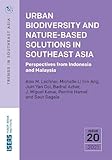Urban Biodiversity and Nature-Based Solutions in Southeast Asia : Perspectives from Indonesia and Malaysia / Alex M. Lechner, Michelle Li Ern Ang, Juin Yan Ooi, Badrul Azhar, J Miguel Kanai, Perrine Hamel, Saut Sagala.
Material type: TextPublisher: Singapore : ISEAS Publishing, [2021]Copyright date: ©2021Description: 1 online resource (42 p.)Content type:
TextPublisher: Singapore : ISEAS Publishing, [2021]Copyright date: ©2021Description: 1 online resource (42 p.)Content type: - 9789815011210
- online - DeGruyter
| Item type | Current library | Call number | URL | Status | Notes | Barcode | |
|---|---|---|---|---|---|---|---|
 eBook
eBook
|
Biblioteca "Angelicum" Pont. Univ. S.Tommaso d'Aquino Nuvola online | online - DeGruyter (Browse shelf(Opens below)) | Online access | Not for loan (Accesso limitato) | Accesso per gli utenti autorizzati / Access for authorized users | (dgr)9789815011210 |
Frontmatter -- FOREWORD -- EXECUTIVE SUMMARY -- 1. INTRODUCTION -- 2. SOUTHEAST ASIAN BIODIVERSITY -- 3. ASSESSMENT OF URBAN GREEN SPACE LOSS IN GREATER BANDUNG, INDONESIA AND GREATER KUALA LUMPUR MALAYSIA -- 4. NATURE-BASED SOLUTIONS AND APPLICATIONS IN BANDUNG AND KUALA LUMPUR -- 5. WAY FORWARD
restricted access online access with authorization star
http://purl.org/coar/access_right/c_16ec
Rapid urbanization and development in Southeast Asia have impacted its high biodiversity and unique ecosystems, directly through the use of forest lands for infrastructure building, and indirectly through increasing ecological footprints. In Greater Bandung, Indonesia and Greater Kuala Lumpur, Malaysia, rapid urbanization over the last thirty years has resulted in an increase in built infrastructure of approximately two and three times respectively. A Nature-Based Solutions approach can potentially underpin urban design and planning strategies in Greater Bandung and Greater Kuala Lumpur, as well as other cities in Southeast Asia, to address biodiversity conservation and also global environmental challenges such as climate change adaption and mitigation, while supporting well-being. Mainstreaming Nature-Based Solutions in Southeast Asia will require knowledge gaps to be addressed, greater awareness, increasing the evidence base, metrics for measuring success, support from institutions and stakeholders, and new and innovative financing. The urgency of global socio-ecological challenges, in particular the biodiversity and climate crisis, means transformational change is needed in Southeast Asia, for urban, ecological, technical, economic, and social systems, while still supporting sustainable development.
Mode of access: Internet via World Wide Web.
In English.
Description based on online resource; title from PDF title page (publisher's Web site, viewed 01. Dez 2022)


